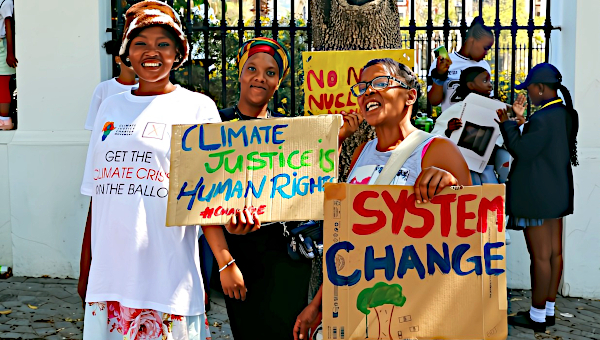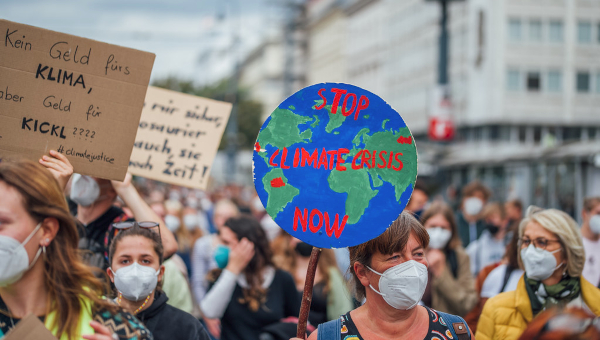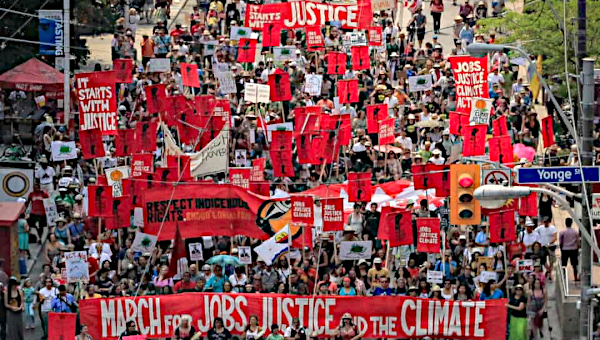Shambles in Copenhagen
Greg Albo
The United Nations conference to address climate change in Copenhagen over the last week has illustrated several crucial features about the contemporary political setting, as Obama completes a year in power in the United States, NATO plots a military surge into the war setting spanning Palestine to Afghanistan and an economic recovery staggers along.
First, in the current balance of social forces in North America and globally, it is impossible to get committed political action to change the existing economic model of development. This is in the specific sense of a reform of the fossil fuel-dependent, outward-oriented, finance-led, labour-repressing economic model of neoliberal globalization; and in the larger sense of a rupture with the ecologically-destructive profit-driven system of capitalism.
Second, it is clear that despite the financial crisis of 2007-09, there has been no break with the power structures of neoliberalism: any interference in market relations to shift distributional relations (including the relations with how much humans withdraw from nature) is blocked (as opposed to government interventions to preserve the power of banks and financial capital); finance capital remains a central force backing the financialization and commodification of the environment; and that the U.S. state and imperialism remains at the core of global decision-making and the ordering of the relations between states. While there are cracks and some modulations in these power structures (notably, the rise of China, Brazil and India), there is no dramatic shifting in power alliances so as to open new vistas for alternate developments (although the interventions at Copenhagen of Bolivia, Venezuela – leaving aside some aspects of their own oil and gas policies for the moment – and others in the ALBA pact were notable for their insistence that an alternate path is more necessary than ever).
Third, the turn to market environmentalism of so much of the environmental movement in North America has been in equal parts political and ecological disasters. This effort to form alliances with the capitalist classes and the state within the confines of neoliberalism has done nothing to advance solutions to the most crucial ecological issue of the day – carbon emissions reduction. At the same time, it has shifted the ecology movement to the political right where it spends most of its time in concertation with governments and business and the rest spinning out green entrepreneurship and localism as solutions to global economic and environmental crises.
There is a particular tragedy here of the ecology movement embrace of the market over the last decade as a solution to ecological problems and especially greenhouse gas reductions (GHG). This is the best GHG reduction strategy that can immediately be implemented – but also better for the long-run in its focus on quality of growth and human development and not quantity of sustainable capitalist growth – lies with many of the traditional demands of the Left.
Some of these are: worktime reduction and increased leisure-time; massive expansion of collective services such as daycare, education, parks, recreation facilities, museums, and so on; increased funding of the ‘grant economy’ for cultural workers, community festivals and the like; a mass shift to public transportation funded by long-term (50 year) bond floats; major income redistribution to account for the huge class differences in causing environmental degradation; increased worker input into the ecological and health conditions of labour processes; expansion of the cooperative and worker-controlled enterprise sectors as a basis for building alternate local communities; debt relief for the global south; mass transfer of sustainable technologies; sharply constrained growth in the north to provide room for higher equalizing growth in less developed zones; and so forth.
From this foundation, it is the possible to integrate energy-switching strategies, retro-fitting, carbon taxes and so forth in a way that builds actual alternate social and ecological relations in a system of responsible production. Instead, the mainstream of the North American environmental movement has been absorbed in the politically fruitless and intellectually dishonest pursuit of a cap-and-trade financial-market led strategy for carbon emissions reduction – like bloodletting, a cure that can only worsen the disease. [See “The Story of Cap and Trade”]
There is only one good thing to have come out of the Copenhagen debacle. The sordidness of the final agreement may well stall extensive implementation of the cap-and-trade system for carbon emissions, and the ‘clean development mechanisms’ foisted on the global south– the latest mechanism of imperialism – in the name of GHG reduction. Well, maybe another positive note: it showed clearly the Conservative government of Stephen Harper in Canada toadying behind the U.S., bought and paid for shills of the Alberta oil and gas industry and as strong of defenders of neoliberalism as exist anywhere on the planet. Now the whole world can see what Canadians should know well: the ‘ugly Canadian’ can no longer be shielded by nationalist cultural mythologies.
The Bullet prints here two important interpretations of the Copenhagen events and the political openings they might signal.
Why We Took to the Streets
Maude Barlow and Andrea Harden-Donahue
Inaction from business interests and political leaders in Copenhagen has forced the rebirth of the movement founded in Seattle
When stuck between a rock and a hard place, there comes a time when a decision must be made. Will you lie down and suffer or choose to push with all of your will to move the rock out of your way?
Caught between increasing marginalization at, and exclusion from the Bella Center (the site of the climate negotiations) and the failure of the summit to address the climate crisis, the Dec. 16 Reclaim the Power march in Copenhagen chose to move the rock. The march, thousands strong, literally pushed for climate justice.
Joining this multi-faceted mass action of non-violent civil disobedience were people from all around the world organized in diverse networks.

The objective was not to close down the summit but rather, for one day, to open a space in the UN area for a people’s assembly. Hundreds of delegates, led by members of the Bolivian delegation and the Indigenous Peoples Caucus, walked out of the Bella Center to join with the thousands of people on the other side of the fence. People were attempting to overcome physical barriers that stood in the way of holding the people’s assembly and uniting the two groups.
It is of fundamental importance to emphasize that there was no violence on the part of demonstrators.
While the action was one of civil disobedience, it was non-violent; the demonstrators did not respond to police with violence. Video footage clearly attests that participants remained peaceful, which is no easy task when your eyes are burning from pepper spray and tear gas and your body is bruised from batons. We personally witnessed police officers clubbing protesters, large police trucks being used to herd protesters to the point of falling over and police dogs being used for intimidation.
Some will question whether this was necessary. But this action physically and visually demonstrated against the direction climate talks had taken.
Despite the responsibility for emitting more than two-thirds of historical greenhouse gas emissions into an atmosphere all life shares, most developed countries continue to resist deep emission cuts. While it appears there may be short and long-term commitments to climate financing emerging from Copenhagen at the time of writing, the numbers are still below predicted need, particularly if states fail to keep global warming below 1.5 degrees.
There are also legitimate concerns being raised about the sources for funding and potential conditions.
On the streets, false solutions discussed in the Bella Center were denounced. This included examples such as carbon offsets, which allow corporations to avoid reducing emissions in the global North by purchasing credits generated by projects in the global South – projects which often do little to reduce emissions and can cause serious social and environmental harm.
There is a lot of concern and, yes, even anger at the fact that so many voices and perspectives have been actively silenced from official talks.
Deep concern has been expressed about the role of corporations and the business lobby. While most accredited non-governmental organizations were shut out in the final days of negotiations, the World Business Council for Sustainable Development (known to advocate for industry self regulation as well as promoting carbon capture and storage and global carbon markets) hosted a side event alongside the United Nations Framework Convention on Climate Change on Dec. 16, with privileged access to key decision makers. It is not a stretch to see how profit-driven business interests can and do conflict with the objective of addressing the climate crisis and advancing climate justice – ensuring this process reduces inequity and promotes greater equality.
Further, with insiders reporting that U.S. negotiators were likely to back the World Bank as the trustee of a new climate fund, it appeared that we would see more business as usual. The World Bank has shown disregard for the transition to a low-carbon future, continuing to significantly fund fossil fuel development and promoting problematic carbon markets.
The movement behind the Reclaim the Power action challenges the world to recognize that we cannot address the climate crisis until we recognize root causes of this crisis, including unsustainable production, consumption and trade. Real solutions have been much of the focus at the Klimaforum, the alternative peoples summit in Copenhagen.
Real solutions discussed include keeping fossil fuels in the ground, respect for indigenous land rights, just transition plans for workers and communities, water as a commons, climate reparations for the global South, vastly increased conservation and energy efficiency, locally owned and controlled sustainable energy alternatives and agriculture as well as sustainable transportation. These solutions are intimately tied to building a just economy for people and planet, where the pursuit of economic growth does not trump public interest.
Ten years ago a highly effective civil society movement was born in Seattle to challenge the domination of transnational corporations in determining economic, social and environmental policy through the World Trade Organization and International Monetary Fund. The climate justice movement has transformed Copenhagen into the second coming, direct descendant of Seattle.
This is why the Reclaim the Power action was of such importance and this is why the Council of Canadians took to the streets in Copenhagen.
Maude Barlow is national chairperson of the Council of Canadians, and Andrea Harden-Donahue is an energy campaigner with the Council of Canadians.
“Imperial” Climate Deal
Rejected by Poor-Country Delegates
Speaking on behalf of the Bolivarian Alliance for the Americas, President Hugo Chávez of Venezuela took the floor at the plenary of the COP15 climate talks in Copenhagen to denounce the final “deal” that was soon to emerge and be imposed on the majority poor-country delegates, and which would fall far short of their demands. Chávez accused U.S. President Barack Obama of behaving like an emperor “who comes in during the middle of the night … and cooks up a document that we will not accept, we will never accept.”
Chávez declared that “all countries are equal.” He would not accept that some countries had prepared a text for a climate deal and just “slipped [it] under the door” to be signed by the others. He accused them of “a real lack of transparency.”
“We can’t wait any longer, we are leaving … We are leaving, knowing that it wasn’t possible getting a deal,” he said.
Evo Morales, the president of Bolivia, also took the floor to express
annoyance at the way a climate deal was being thrashed out by a small group of world leaders at the last minute. "If there is no
agreement at this level, why not tell the people?", he said at the plenary meeting. He called for further consultations with the people.
“Who is responsible?” Morales asked. Concluding that “the responsibility lies on the capitalist system – we have to change the capitalist system.”
Sham Deal
The so-called “Copenhagen Accord” was pushed by the U.S. and Australia, and sealed in meetings behind closed doors with the leaders of China, India, Brazil and South Africa. It was announced by Obama late on the evening of December 18, and presented as “final” even before the COP15 delegates had a chance to vote on it. It does not commit governments to interim 2020 carbon emissions-reduction targets, or to legally binding reductions and only expresses a general aim of limiting the global warming increase to 2 degrees Celsius – well above the 1 degree C-1.5 degree C target most delegations were calling for.
Lumumba Stanislaus Di-Aping, delegation head of the G77 group of developing countries, rejected the accord and vowed to fight it. “Obama, acting the way he did, definitely
established that there’s no difference between him and the Bush tradition,” he told Time magazine.
Nnimmo Bassey, prominent Nigerian environmentalist and chair of Friends of the Earth International,
described Copenhagen
as “an abject failure.”

“Justice has not been done. By delaying action, rich countries have condemned millions of the world’s poorest people to hunger, suffering and loss of life as climate change accelerates. The blame for this disastrous outcome is squarely on the developed nations. We are disgusted by the failure of rich countries to commit to the emissions reductions they know are needed, especially the U.S., which is the world’s largest historical emitter of greenhouse gases.
“In contrast African nations, China and others in the developing world deserve praise for their progressive positions and constructive approach. Major developing countries cannot be blamed for the failure of rich industrialised countries.
“Instead of committing to deep cuts in emissions and putting new, public money on the table to help solve the climate crisis, rich countries have bullied developing nations to accept far less. Those most responsible for putting the planet in this mess have not shown the guts required to fix it and have instead acted to protect short-term political interests."
“Real Leadership” On The Streets
“The only real leadership at the conference has come from the hundreds of thousands of ordinary people who’ve come together to demand strong action to prevent climate catastrophe. Their voices are loud and growing – and Friends of the Earth International will continue to be part of the fight for climate justice.”
Greenpeace criticised the accord for not having “targets for carbon cuts and no agreement on a legally binding treaty.” Oxfam International called the deal “a triumph of spin over substance. It recognises the need to keep warming below two degrees but does not commit to do so. It kicks back the decisions on emissions cuts and fudges the issue of climate cash.”
The “accord” confirms the continuation of the Kyoto Protocol and the United Nations Framework Convention on Climate Change. Developed countries commit collectively to providing $30-billion (U.S.) in new, additional funding for developing countries for the 2010-2012 period. It also says developed countries support “a goal of mobilising jointly 100 billion dollars a year” by 2020 from a variety of sources.
Erich Pica, president of the Friends of the Earth (USA), said that the:
“Climate negotiations in Copenhagen have yielded a sham agreement with no real requirements for any countries. This is not a strong deal or a just one – it isn’t even a real one. It’s just repackaging old positions and pretending they’re new. The actions it suggests for the rich countries that caused the climate crisis are extraordinarily inadequate. This is a disastrous outcome for people around the world who face increasingly dire impacts from a destabilising climate…
“With the future of all humans on this planet at stake, rich countries must muster far more political will than they exhibited here. If they do not, small island states will become submerged, people in vulnerable communities across the globe will be afflicted with hunger and disease, and wars over access to food and water will rage.
“The devastation will extend to those of us who live in wealthy countries,” said Pica. “The failure to produce anything meaningful in Copenhagen must serve as
a wake up call to all who care about the future. It is a call to action. Corporate polluters and other special interests have such overwhelming influence that rich country governments are willing to
agree only to fig leaf solutions. This is unacceptable, and it must change.
“Fortunately, while the cost of solving the climate crisis rises each day we fail to act, the crisis remains one that can largely be averted. It is up to the citizens of the world – especially citizens of the United States, which has so impeded progress – to mobilise and ensure that true solutions carry the day. I firmly believe that together, we can still achieve a politics in which climate justice prevails.” •
This article originally published by Links.





